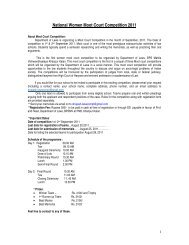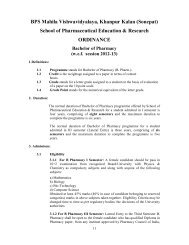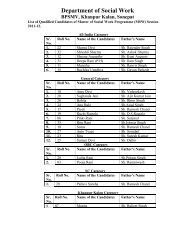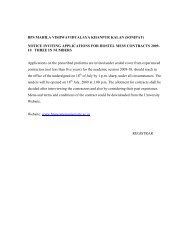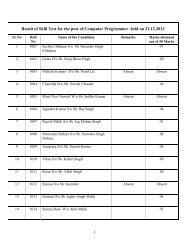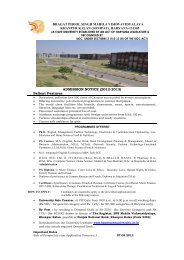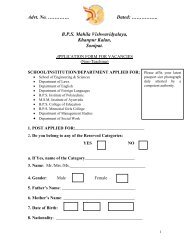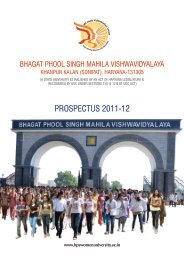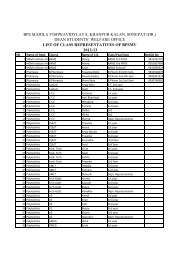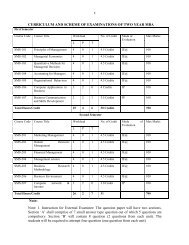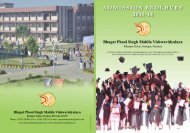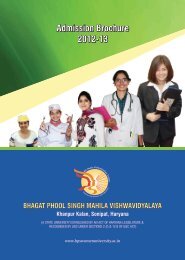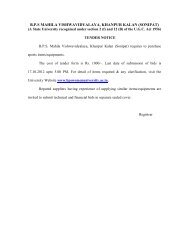Phd Syllabus ECE & FT - BPS Mahila Vishwavidyalaya
Phd Syllabus ECE & FT - BPS Mahila Vishwavidyalaya
Phd Syllabus ECE & FT - BPS Mahila Vishwavidyalaya
You also want an ePaper? Increase the reach of your titles
YUMPU automatically turns print PDFs into web optimized ePapers that Google loves.
PPP- 721Independent StudyL T P Credits0 2 6 4Study of research oriented activities involving problem formulation, literature review,plan of the research work related to the Ph.D. topic. The student is required to presentthe same in department.Note: Assessment/ evaluation of the candidate will be carried out by internal board ofexaminer on the basis of literature review, proposal, presentation and viva voce.PPP- 722Scientific CommunicationsL T P Credits :- 2 6 4Application of computer and information technology in scientific research: operatingsystem, use of software package such as MS Office, Power Point, Excel, SPSS, etc.application of data base of literature via internet.Introduction of English Grammar: Word Choice, Sentence Structure, paragraphstructure and comprehension.Types of Scientific Communications, Basic concept of paper writing, Importance ofpublishing research papers, writing review articles, citation index/impact factorPublishing Research paper:a) Preliminaries, Format, Choosing Journalb) Title, Running Titlec) Authors: Single and Multi authorshipd) Writing Abstracte) Introduction sectionf) Materials and Methods Sectiong) Result Sectionh) Figures: Design Principles, Legends, Table components, Graphs: Types, Style,Tables v/s Graphi) Discussion Section: Format, Grammar Style, Content.j) Acknowledgementsk) References : Different Stylesl) Selecting Keywordsm) Communication with the Editor, Handling Referees’ Comments, Galey ProofsPreparing and Delivering of Oral and Poster PresentationsAvoiding Plagiarism, introduction to intellectual property rights i.e. patent and copyright, etc. Preparing documents for MoUs, Confidentiality Agreements.The research student is required to prepare a concept paper/working paper/reviewpaper by reviewing at least 40-60 research papers/reference books/ etc. The student isrequired to present the same in department/conference/ seminar/ workshop/ journal.Note: Evaluation/ assessment in terms of submission of scientific communication/article in journal or to the concern guide.
PPP-723L T P Credits0 2 2 2Software Packages LabStudy and application of tools and software packages related to the topic anddiscipline of the study and department. MatLab, Orcad, Labview, Mathcad etc simulation and software packages inElectronic and Communications Engineering. Pattern making, grading and marker making, Textile and apparel testing anddesigning software’s in Fashion and Technology.Note: Evaluation/ assessment of the candidate in terms of practical exam and vivavoce by internal board of examiner.Departmental subjects in Electronic and Communications Engineering1. PEL-701 Advanced Signal processing2. PEL-702 Modeling & Simulation of Communication Systems3. PEL-703 Advance Image ProcessingDepartmental subjects in Fashion and Technology.1. PFL-701 Textile and Apparel Testing2. PFL-702 Technical textile3. PFL-703 Advances in Apparel Technology
PEL-702Modeling & Simulation of Communication SystemsL T P Credits Theory Exam: 50 Marks4 0 - 4 Duration of Exam 3 HoursUNIT - I IntroductionConcept of Simulation, System, Model, Types of Model, Univariat & MultivariatModels, Deterministic & Stochastic models, Continuous & Discreet Models,Analog & Digital Simulation, Real Time Simulation, Hybrid Simulation,Advantages & Limitations of Simulation, Steps in Simulation StudyUNIT – II Random NumberPsedue Random Numbers, Generation of random numbers, properties & testing ofrandom numbers, generation of random variables using commondistributions,Bounds and approximations of Random processes.Review of signals and systems, Continuous & discrete LT systems. Simulation ofrandom variables & random processors, Transformation functions,transformations of random processes, sampling & quantization for simulationUNIT – III Modeling of communication systemInformation sources encoding/decoding, base band modulation and mapping, RFand optical modulation demodulation, Filtering communication channels andmodels, Noise interference and error, Control coding, Synchronization, Spreadspectrum techniques.UNIT – IV Simulation and modeling methodologySimulation environment, Modeling consideration, Performance evaluationtechniques, Error sources in simulation, design of simulation experiment – lengthof run, replication, elimination of initial bias, variance reduction techniques.Simulation of communication systems using PSpice / MAT labBooks Recommended:1. Simulation of Communication Systems by M.C. Jeruchim & Others, Plenum Press.2. Modern Digital and Communication Systems by Lathi B.P.3. System Simulation – by DS Hira4. Discreet Event System Simulation – by Banks, Carsen, Nelson, Persian Edu. Asia.5. Related IEEE/IEE publicationsNOTE: Eight questions will be set in all by the examiners taking two questions fromeach unit. Students will be required to attempt five questions in all selecting at leastone question from each unit.
PEL-703Advance Image ProcessingL T P Credits Theory Exam: 50 Marks4 0 - 4 Duration of Exam 3 HoursUnit – I1. Introduction: Fundamental steps in Digital Image Processing, Components of anImage Processing system, Digital Image Fundamentals: Elements of VisualPerception, Light and the electromagnetic spectrum, Image sensing and Acquisition,simple image formation model.2. Image sampling and Quantization: concept of sampling & quantization,Representation of digital images, spatial and Gray-level resolution, Relationshipsbetween pixels-neighbors of pixel, Adjacency, connectivity, regions, and boundaries,distance measures, Image operations on a pixel basis.Unit – II3. Image enhancement in Spatial domain: some basic Gray Level Transformations,Image negatives, log transformations, Power-Law transformations, piecewise –LinearTransformation functions; Histogram Processing, Enhancement using arithmetic/logicoperations, Basics of spatial filtering.4. Image Enhancement in frequency domain: Introduction to Fourier Transformand frequency domain, Two dimensional D<strong>FT</strong> and its inverse, Filtering in thefrequency domain, correspondence between filtering in the spatial and frequencydomains; Smoothing frequency domain filters: Ideal lowpass filters, butterworthlowpass filters, Gaussian lowpass filters; sharpening frequency domain filters(Ideal,butterworth & Gaussian highpass filters) Homomorphic filtering, Implementation:properties of 2-D Fourier Transform, Computation of inverse Fourier Treansformusing forward Transform algorithm, Fast Fourier Transform.Unit – III5. Image Restoration: A model of the image degradation/ restoration process, Noisemodels: Spatial and frequency properties of noise, Periodic noise, Estimation of noiseparameters, Restoration in the presence of noise only spatial filtering: Mean Filters,Order statistics Filters, Adaptive filters; Periodic noise reduction by frequency domainfiltering, Estimating the Degradation Function, Inverse Filtering. Minimum MeanSquare Error (Wiener) filtering6. Image Compression: Fundamentals, Image Compression Models: The sourceencoder and decoder, the channel encoder and decoder, elements of informationtheory: Measuring information, The information channel, Fundamental codingtheorems; error free compression, lossy compression,Unit – IV7. Image representation by stochastic models, Covariance models, stochasticmodels, one dimensional causal models, Auto Regressive, Moving Average, ARMAmodels.8. Image Segmentation: Detection of Discontinuities: Point detection, LineDetection, Edge detection; Edge Linking and Boundary detection, Thresholding: Roleof Illumination, basic global thresholding, basic adaptive thresholding, Regionalbased segmentation: Basic Formulation, Region growing, region splitting andmerging; use of motion in segmentation: Spatial Techniques, Frequency DomainTechniques..Text Books:1. Rafael C. Gonzalez and Richard E. Woods, “Digital Image Processing”, Pearson2. Anil K Jain, “Fundamentals of Digital Image Processing”, PHI Edition 1997.Reference Books:
PFL-701Textile and Apparel TestingL T P Credits:Theory Exam: 50 Marks3 2 0 4 Duration of Exam: 3 hrsUnit – IIntroduction: Aim and scope of testing, Sample and Population, Sampling techniques.Fibre, yarn and fabric testing concepts, instruments and applications.Fabric comfort properties: water-vapour transmission through fabrics, Wickingproperties, Air permeability and wettability.Unit – IIOverview of low stress mechanical properties, FAST, Kawabatta Evaluation System.Analysis of KES, FAST data.Garment testing concepts, instruments and applications: dimensions, seam strength,seam slippage, adhesion between interlining and fabric, shrinkage, zippers, buttons,snap fasteners and other general garment properties. Needle cutting/yarn severance.Unit – IIITesting of specially designed fabrics and finishes: Flame resistance, Water repellency,etc. Computer colour matching: concept of colour measurement and applications.Different fastness (light, washing, perspiration, sublimation, chlorine, etc.) propertiesand their evaluation.Unit – IVTesting of Technical Textiles: Testing of filtration charaterstics, test for geotextiles,test for protective clothing, test of various form of medical textiles, tests for carpetsand nonwoven fabrics.International quality parameters and various standards such as AATCC, SDC, ASTM,etc. Innovation in textile and garment testing.Note: Eight questions will be set of equal marks in all by the examiners taking twoquestions from each unit. Students will be required to attempt five questions in allselecting at least one question from each unit.Books Recommended:1. Physical Testing of Textiles, Woodhead Publishing Ltd, Cambridge, 2002. SavilleB P2. Testing and Quality Management, Ed. V. K. Kothari, IAFL Publications, NewDelhi, 1999, V. K. Kothari.3. Principles of Textile Testing”, CBS Publishers and Distributors, New Delhi,1999, Booth J E.4. Textile Testing, SSM Institute of Textile Technology, Angappan P &Gopalakrishnan R,Komarapalayam, 2002.5. Apparel quality Control, V.K. Mehta6. Basu A, “Textile Testing”, SITRA Coimbatore, 2002.
PFL-703 Advances in Apparel TechnologyL T P Credits:Theory Exam: 50 Marks3 2 0 4 Duration of Exam: 3Unit – IInnovation in seams, stitches, sewing thread, needles, marker, planning and cuttingtechnology.Unit – IIUnderstanding the need and use of various construction types for sewing machinery inregards to quality and performance improvement and ease to operate,Advancement in sewing Machinery: Directive for operating special purpose sewingmachinery. Various bed types of machine and their applications in manufacturingprocesses: Flat Bed, large area Raised Bed, DNLS m/c, Over Lock m/c, Flat Lockm/c, Multi thread Chain Stitch m/c, Blind stitch machine and their developments.Unit – IIIVarious types of feed mechanisms, their suitability for different fabrics andconstruction of components and their contribution towards quality and productivity.Application of programmable machines in garment industries. Developments andautomation in garment manufacturing machines and industries.Unit – IVScientific approach in sewing techniques. Ergonomic concepts and application in thesewing room, Introduction of time targets and quality aspects, Practical approach toachieve targets, Understanding of different shaped sewing lines in actual garments,Material Handling, Postural Techniques, Work Study, Working Time Arrangement,Shift Work, Motion Economy, anthropometric, Basic Sewing Patterns, Convexsewing pattern, Curved sewing pattern, Angular sewing pattern, etcNote: Eight questions will be set of equal marks in all by the examiners taking twoquestions from each unit. Students will be required to attempt five questions in allselecting at least one question from each unit.Suggested Text Books & References:1. Knitted Clothing Technology, Brackenburry2. The Technology of Clothing Manufacture, Harold Carr,Barbara Latham3. Introduction to Clothing Manufacture, Gerry Cooklin
S.No.1.School of Engineering & Sciences (SES)<strong>BPS</strong> <strong>Mahila</strong> <strong>Vishwavidyalaya</strong>, Khanpur Kalan (Sonepat)Papers Setters for Pre-Ph.D. course work in Engineering and TechnologySubjectResearchMethodologyPPL-701Panel of Examiners1. Dr. D. K. Madan, Associate Professor, TIT&S, BirlaColony, Bhiwani. Mobile No.94162320692. Dr. Sandeep Arya, Department of <strong>ECE</strong>, GJUS&T,Hisar. Mobile No. :94163975673. Dr. S. Batra, Professor, Department of mathematics,DCRUS&T, Murthal Mobile No.:094164730484. Dr. Lalit Jajpura, Reader- Fashion Technology, SES,<strong>BPS</strong>MV, Khanpur Kalan, Sonipat. Mobile No.:099960084312.3.4.5.6.Independent StudyPPP- 721ScientificCommunicationPPP- 722ComputationalSoftware PackagesLab PPP- 723Textile andApparel TestingPFL-701Technical TextilesPFL-702Internal / Board of examinerInternal / Board of examinerInternal / Board of examiner1. Prof. B.K. Behra, IIT Delhi, Hauz Khas, New Delhi.Mobile No.:098188084232. Dr. Lalit Jajpura, Reader- Fashion Technology, SES,<strong>BPS</strong>MV, Khanpur Kalan, Sonipat. Mobile No.:099960084313. Dr. Rajeev Varshney, Deptt. Of textile engineering,Giani Zail Sing College of Engg. & Technology,Dabwali Road, Bhatinda-151001. Mobile No.:094177533394. Dr. S.S. Mahish, Associate Professor, TITS, BirlaColony, BhiwaniMobile No.:94160911681. Dr. Lalit Jajpura, Reader- Fashion Technology, SES,<strong>BPS</strong>MV, Khanpur Kalan, Sonipat. Mobile No.:099960084312. Mr. Harinder Pal, Assistant professor, SES, <strong>BPS</strong>MV,Khanpur Kalan, Sonipat. Mobile No.: 094162413353. Dr. Nandan Kumar, B-39/40, Gandhi Vihar, Delhi-110009. Mobile No.: 099966250504. Dr. S.S. Mahish, Associate Professor, TITS, BirlaColony, Bhiwani Mobile No.:9416091168
7.Advances inApparelTechnology PFL-7031. Dr Kusum Chopra, Prof,NI<strong>FT</strong>,Hauz KhasMobile No.:098180781442. Dr. Lalit Jajpura, Reader- Fashion Technology09,SES, <strong>BPS</strong>MV, Khanpur Kalan, Sonipat. Mobile No.:099960084313. Mr K N Chaterjee , Associate Professor, TIT&S, BirlaColony, Bhiwani. Mobile No.: 92551766494. Mr Ashish Hooda ,Fashion Technology, SES,<strong>BPS</strong>MV, Khanpur kalan, Sonipat.Mobile No.:09971734730



